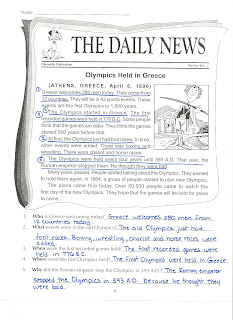Homework can be a challenge for every family and as students enter third grade, the homework expectations increase. This post is intended to give families and students an idea of what to expect for third grade homework. This post will also provide you with a reference to refer to throughout the year. I will discuss homework at the Parent Information Night as well. As each student is unique, this information may not reflect your student's homework as I will try to differentiate it to make it as beneficial as possible.
Homework has changed significantly over the years, both in purpose and amount. I strongly support the research based recommendations of 3rd graders having regular homework to primarily develop positive time management and work habits and reinforce previously introduced content, rather than to learn new material (which will become the focus in later years). The exception to this is in word study, where regular practice develops mastery, retention and recall. I also support the recommendations of approximately 10 minutes of homework per grade level. However, as the school year begins and students return from summer, homework can take considerably longer than this until they get back into the swing of things or develop important skills. Seeing this through, as hard as it can be, is important for students' success and will make future homework much easier for them. We have practiced homework at school so students understand my expectations and have had experience being successful in an appropriate amount of time.
Some students may need modified homework depending on the current academic levels. Please communicate with me if you find your student's work is simply too hard or too much and I will work with you to support them. They may need modified homework or simply modified practices, e.g., a quiet environment to complete it or change in routine.
More homework is not the same as differentiated homework.
I do not grade homework in the traditional sense as it is often not done independently, but I do check to ensure it has been attempted.
Homework habits are important to your student's success as well. Most research (and parents) find their students are more successful when they have clear, predictable, and routine homework habits. This can be hard these days as many of our children are very busy with additional activities such as sports and social organizations after school. I recommend:
- Consistent routine: Your student may do better to come straight home and finish their homework, or they may need a break and a snack. You know your student best. The goal is to aim for consistency. I do recommend using a carrot, e.g., computer time, as a reward once homework is finished.
- Place: Your student will do best with few distractions (e.g., away from electronics, pets, and siblings) in a quiet environment. You may even plan to take them to the library after school to do their homework.
- Time management: Your student should develop a sense of how they spend their time when they are "working." My own two students are vastly different. One will knock out their homework with concentrated effort in ten to twenty minutes. The other had to overcome a habit of balking at their work longer than the actual work took. I simply timed their on and off task work and shared it with them once they were done. I also had to be very firm in demanding they finish their homework prior to doing anything else. This can be difficult. I know from personal experience. There are no magic short cuts. My only advice is to stick to it and feel free to involve me in discussions with your student to reinforce that this is work I've assigned and its purpose. This can help alleviate any homework fights you may endure.
- Independence: I will explicitly model my homework expectations and strategies and expect your student to attempt it on their own. Let them try before you jump in to help or they may become dependent. However, if your student is struggling, please let me know and I can make modifications.
Nightly Homework - What To Expect
Students will receive homework Monday through Thursday. I do not assign weekend homework. Homework is always due the following day. I find it is easier for students and families to manage nightly homework than packets, which can get pushed till the end of the week for a long night of homework, which defeats the purpose of developing good work habits and time management.
Word Study
Once the school year has gotten under way, your student will be assigned specific spelling words (and more importantly, patterns and rules) to practice nightly. We will also have weekly vocabulary words (along with their parts of speech) and an idiom. We will not start spelling for the first few weeks of school as I will be assessing students developmental spelling levels during this time to determine their needs. I will share specific strategies to help your student practice these patterns in their word study notebook, which they should bring home nightly, at Parent Information Night.
Reading
I love to read! I read fiction and non-fiction, from biographies and history to fantasy and science fiction. I will try to share my love of reading for pleasure and we will develop many deep thinking reading skills at school.
However, my homework focus will be on reading for information, the primary reading activity your student will engage in for the remainder of their education. Each of these short stories will be on a non-fiction historical event. To start the year, your student will receive a one page reading and response passage, The Daily News, nightly. I've provided a sample below to show you what these look like and how I expect them to be completed (although I suggest pencil). The first week's homework goal is simply to get students into a routine and I will accept most homework regardless of the skills demonstrated. I will work hard to identify students' reading levels as quickly as possible, but will start the year assigning everyone the same homework.
Nightly Reading Homework Sample
(Click to enlarge.)
(Click to enlarge.)
The backside includes a more complex comprehension assignment to deepen student understanding. The assignment is to write a first person narrative of the historical event they are reading. If possible, please have your student type their extended response. This will give them nightly keyboarding (see below) practice and kill two birds with one stone.
I will always recommend additional daily reading, including the weekend, but will leave that to each family's discretion. I am happy to help if you find you would like to do this, but need support finding appropriately leveled books that interest your student.
Math instruction has probably changed more than any other academic area since most of us were in school. Where we learned algorithms and memorized linear math, today's students are taught to truly understand math and to problem solve using a variety of possible strategies to arrive at a single common answer. Your student's math homework will review common core math standards and problem solving. I also encourage you to support your student's fact fluency. I will share strategies for this at Curriculum Night. These strategies, which I will also share explicitly on the blog as I introduce them, will be your student's anchor to recalling or quickly solving these facts. It provides them with a way of organizing facts into groups (e.g., spelling patterns) without having to memorize 100's of seemingly independent math operations. Your student's familiarity with these more basic concepts will support their ability to do far more complex math at school.
I will discuss multi digit operations at our Parent Information Night. Please hold off on teaching your student traditional algorithms until we've had a chance to discuss these.
Keyboarding
Keyboarding is becoming an indispensable skill for all students, especially for those with fine motor challenges. Beginning this year, many assessments will be taken solely on computers and students' ability to concentrate on their composition and operations, rather than hunting for the appropriate key, will make a significant difference in their ability to show what they know. I will do weekly keyboarding instruction, but encourage consistent at-home keyboard practice. Students can try any of the following self-instruction keyboarding sites:
www.bbc.co.uk/schools/typing/
www.typingweb.com/teacherportal
www.freetypinggames.net
www.mcs.k12.in.us/Page/7673
Sick and Vacation Homework
I do not assign homework for students who are ill or take planned absences during the school year. If a child is ill I want them to rest, recover and rejoin us as soon as possible. For those who are travelling, I hope they will read and fully enjoy their trip. Much can be learned outside of the classroom and I fully support developing young people's awareness of the wider world's diversity.




.jpg)



